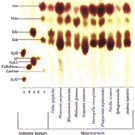Primary Cell Wall Composition of Bryophytes and Charophytes

Just another Glc in the wall?
The emergence of photosynthetic land plants was a major step in the evolution of the biosphere, bringing major changes to the terrestrial environment and leading ultimately to extensive vegetation cover - �earth�s green mantle�. The move from water to land presented many challenges, including changes in the availability of nutrients and water, different parameters for gas exchange and, in vertical growth, problems of support. Modern phylogenetic research suggests that land plants evolved from green algae, very similar to present-day charophytes, and that early plants resembled �primitive� bryophytes extant today. A key feature in the adaptation to life on land has been the cell wall; it is of great interest to understand the significant changes in cell wall biochemistry and architecture that have occurred during plant evolution. Zo� Popper and Stephen Fry (University of Edinburgh, pp. 1-12) have thus undertaken a thorough study of cell wall biochemistry in charophytes and in bryophytes ranging from �primitive� to �advanced�. Amongst a wealth of interesting data, a number of important findings relate to the evolution of land plants. First, the walls of charophytes and of more primitive (and mostly moisture-loving) bryophytes contain much higher amounts of glucuronic acid (GlcA) and galacturonic acid (GalA) than do the walls of the more drought-tolerant advanced mosses. The authors suggest that GlcA-, GalA- and mannose-rich polymers form sponge-like walls, facilitating water uptake from the surroundings but not contributing to skeletal support. In contrast to the uronic acids, xyloglucans (a major component of the �hemi-cellulose� fraction of higher plant cell walls) are absent from charophytes, but are present even in primitive bryophytes. Indeed, xyloglucans are completely correlated with terrestrial life. These data thus provide a link between cell wall structure and major steps in evolution: a great example of elucidating the past by thorough study of the present.
University of Exeter, UK
j.a.bryant{at}exeter.ac.uk